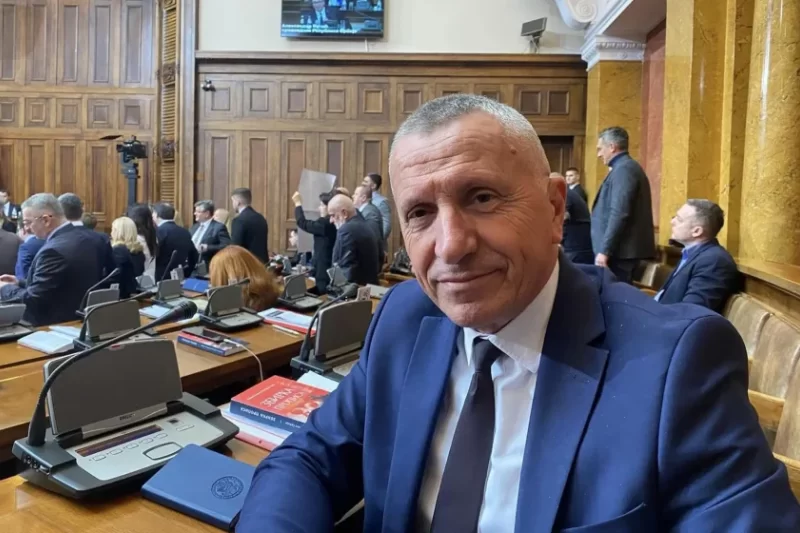'Xenophobia, Hate Speech on the Rise'
"Albanians can support the protests in principle in Serbia, hoping that a more democratic government could improve the rights of minorities, but always with the caution and attention that during the journey things can take another completely unwanted direction, " said Albanian Deputy in Serbian Parliament Shaip Kamberi in an exclusive interview with Albanian Daily News.
According to him, the new post-Vucic Serbia must finally take responsibility for the criminal wars of the 90s, give up aspirations for hegemony in the Balkans, reach an agreement with Kosovo.
Asked about the stance of the incoming Trump administration towards our region and individual countries, Mr. Kamberi was of the opinion that for Albania, Kosovo, and other regional allies, the goal should be for American policies to support the rule of law, democratic progress, minority rights, and the resolution of historical disputes. "Serbia should be held responsible for the agreements reached and that it is not implementing, as well as for regional stability."
The Albanian MP in Serbian Parliament expected Tirana's role to be proactive and strategic. It should intensify diplomatic efforts to raise the issue of the Presevo ??Valley on international platforms. "Strengthening economic and cultural ties with Albanians in Serbia while advocating for their rights can signal solidarity and strengthen their position within Serbia. While it would be desirable that Tirana, similar to Pristina, sets a special fund for the Presevo Valley," said MP Shaip Kamberi in the following interview with ADN:
Albanian Daily News: First of all, let this year be a better time for the people of Presevo Valley community and Albanians throughout Serbia, and you personally. Please what would you tell ADN readers about the perspective of Albanians in 2025 leaving behind a hard year from Serbia discrimination?
Albanian MP in Serb Parliament Shaip Kamberi: The Presevo ??Valley and Albanians throughout Serbia have experienced systematic challenges for decades from the discriminatory powers in Serbia. We have tried to overcome the difficulties in the political process in an institutional way, but the lack of political will in Belgrade has not allowed any progress.
The year 2025 offers an opportunity for collective sustainability and increased international advocacy which is necessary. First of all, the EU should be more demanding towards Serbia to establish the rule of law, to build equality, to eliminate the causes of discrimination. Our focus will remain on ensuring basic rights, preserving identity, culture, language and economic empowerment. Greater international attention is essential to push Serbia to fulfill its obligations and stop discriminatory practices.
At the moment this attention is not enough, therefore the power vacuum in Serbia is using it to continue discrimination against others. Xenophobia and hate speech are on the rise. This is making the lives of minorities unbearable, even though recent events prove that the hatred is not less even towards the Serbs who are opponents of Vucic.
- Serbia is gripped by massive protests of students joined by opposition which demand the resignation of Vucic since many months. How do you asses such a wave of protests, its perspective taking into consideration the determination of the protesters?
- The ongoing protests in Serbia, led by students and the opposition, reflect growing discontent against Vucic's authoritarian rule. The determination of the protesters shows a change in the political climate in Serbia. Tired of a captured state, of a hybrid democracy like the Vucic's state, the reaction is an expression of people exhausted of this autocratic regime. However, the effectiveness of these movements will depend on their ability to maintain momentum, broaden their base, and push for systemic reform. There is a risk that people or groups who may be against Vucic's regime, but who don't love Serbia's European path, will infiltrate the protesters. October 5, 2000 removed Milosevic from power, but the murder of Djindjic finally removed Serbia from the Euro-Atlantic agenda.
History can repeat itself this time, because the Serbian opposition today is united against a common enemy and not because of values ??for the future. International mediation could play a role if the protests escalate into a deeper political crisis. The internationals should support the movements that have a clear Euro-Atlantic agenda and stop flattering the autocrat Vucic for certain reasons.
- Which is the stance of Albanians toward this protest? Do they support it although Albanians are aware that their violated rights are not on its agenda?
- Of course, the Albanians are following these protests carefully. Although, at the moment, the protesters' agenda does not address the rights of minorities, including Albanians, the demand for the need of a more democratic Serbia goes in our favor. Albanians can support the protests in principle, hoping that a more democratic government can improve the rights of minorities, but always with the caution and attention that during the journey things can take another, completely unwanted direction. The new post-Vucic Serbia must finally take responsibility for the criminal wars of the 90s, give up aspirations for hegemony in the Balkans, reach an agreement with Kosovo.
Without the fair treatment of these topics, especially war crimes, and the cessation of the policy of revision of history and the relativization of crimes, I do not see a Serbia with the values ??of liberal democracies.
- Let me turn on the situation between Kosovo and Serbia. How do you see the perspective of the dialogue in 2025?
- The Kosovo-Serbia dialogue faces great obstacles; today, it is almost dead and the fault is not an orphan. The EU mediators themselves have a big part in not being able to move things forward. Progress in 2025 will require international pressure and confidence-building measures. Unfortunately, Serbia's continues refusal to fully implement agreements, such as those under the Brussels framework, including that of Ohrid, hinders progress. Kosovo must take a firm but open stance, ensuring that its sovereignty and territorial integrity are respected while advocating for a balanced dialogue.
Kosovo should receive strong guarantees from European mediators and the American ally that its territory and sovereignty will not be violated. But the surest way to build sustainable peace in the Western Balkans is Kosovo's membership in NATO.
- As a follow up, internationals keep pressing Pristina to make tolerations. Which is your opinion on such a stance and why do they 'spare' Belgrade, that is they do not exert so much pressure on Belgrade to abide by the agreements reached and avoid the aggressive activities?
- The unbalanced pressure on Pristina reflects wider geopolitical calculations. Some international actors prefer stabilocracy to the detriment of democracy. They tolerate the intolerable actions of the autocrat Vucic, not only towards Kosovo but also towards the internal destruction of free speech, independent judiciary, democracy as a whole.
Belgrade is often treated as a "key partner" for maintaining the regional balance, although in practice it has proved the opposite. The mixing of the Serbian church in Montenegro threatened the stability of a NATO state. Threats to secession of Republika Srpska affect Bosnia and Herzegovina, while the terrorist attack in Banjska challenged KFOR and NATO as guarantors of Kosovo's territorial integrity. This approach risks perpetuating impunity for Serbia's aggressive actions and undermines confidence in the process of dialogue.
- Given the complex situation in the Western Balkans with ongoing conflicts between Kosovo and Serbia, Bosnia and Herzegovina and political tension in North Macedonia, according to you which will be the line of the Trump administration? Second, how will the new American administration view individual countries in the Western Balkans, with particular attention on its stance toward Serbia?
- We have to see. President Trump has the slogan "America is first". But the Trump administration's potential focus on transatlantic diplomacy could favor economic deals over political reforms. In this context, the Western Balkans should proactively articulate its needs.
For Albania, Kosovo, and other regional allies, the goal should be for American policies to support the rule of law, democratic progress, minority rights, and the resolution of historical disputes. Serbia should be held responsible for the agreements reached and that it is not implementing, as well as for regional stability.
- What do you expect from official Tirana in support of the cause of the Presevo community in 2025?
- We expect Tirana's role to be proactive and strategic. It should intensify diplomatic efforts to raise the issue of the Presevo ??Valley on international platforms. Strengthening economic and cultural ties with Albanians in Serbia while advocating for their rights can signal solidarity and strengthen their position within Serbia. While it would be desirable that Tirana, similar to Pristina, sets a special fund for the Presevo Valley.
- To conclude, Mr. Kamberi, how do you see the future of the Western Balkans against the background of the rising tension in Europe and the world as some analysts have expressed fear of an explosive situation in the region?
- The Western Balkans has traditionally been the most vulnerable part of Southeastern Europe. Even today, the Balkans remain vulnerable in the face of global tensions, the malignant Russian influence, which is distributed through Serbia. But the region has an opportunity to advance through cooperation and reforms. Greater integration into the EU, partnerships with NATO and regional economic development can mitigate the risks. However, unresolved disputes — whether between Kosovo and Serbia, Bosnia and Herzegovina, or North Macedonia — must be prioritized to avoid escalation. The international community, especially the US and the EU, must play a decisive role to prevent conflicts and promote a sustainable future.














